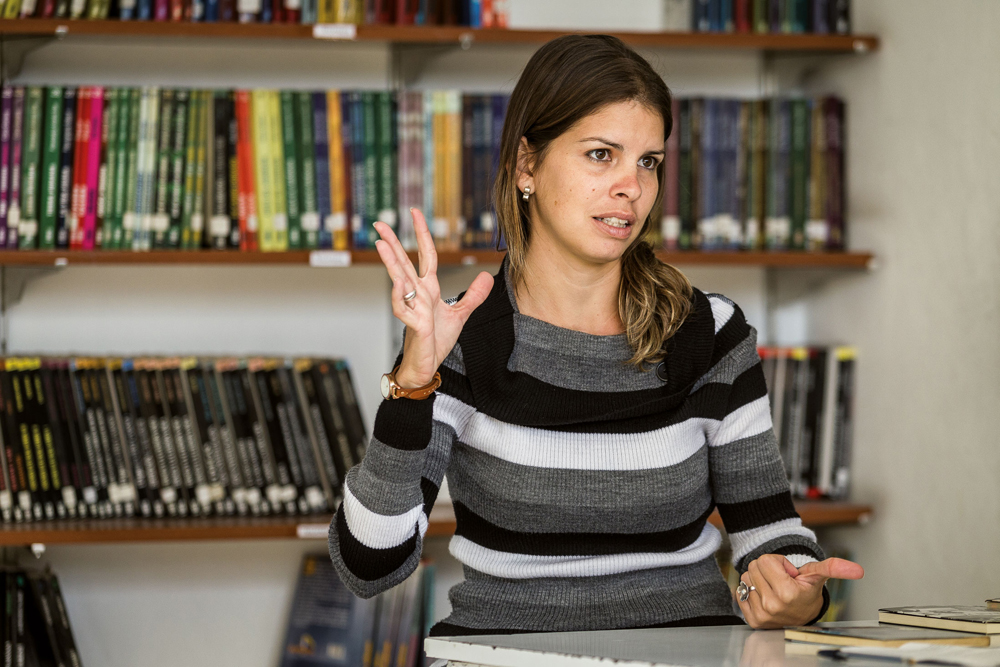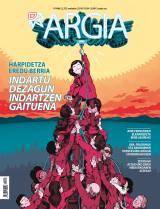"The 500 years of patriarchy are stronger than the 50 years of revolution."
- Maura Febles is a member of the GALFISA group, which studies the social philosophy of Latin America at the University of Havana. From the theory they observe the processes of social change; Febles observes the process of destatalization that is taking place in the Cuban economy. She has analyzed the process with a feminist view and talked about its possibilities and risks in the course Social movements and emancipation agendas.

In the process of de-staging the economy, the most interesting model is that of cooperatives.
One of the main lines of the updating of the Cuban economic model is the process of de-statalization, which the State cannot continue to take on some small tasks. The new agents and economic spaces require new management, as well as ethical, political and values senses. The cooperative is a non-individualistic way of working that does not seek the accumulation of goods, so our bet is for it. Until four years ago they were only agricultural cooperatives, others are new and are developing in urban areas. They compete with private work and the socialist company of the State, which is also looking for new models of change and profitability.
Why has cooperativism not been promoted until recently in Cuba?
The model that concentrated everything around the state worked well until 1990, with the support of the Soviet Union. Then, in the 1990s, there was no time to reflect, some measures were taken to deal with an emergency. There are criticisms that say that changes had to be made then; perhaps yes, but we have to bear in mind that there has never been a cooperative tradition in Cuba, nor before the revolution. We don't have cooperative laws yet, we're working through a law decree.
All kinds of models are being developed, but not just cooperatives. There's the static model with its achaques, private companies, self-employed ... How do you see the relationship between them?
We anticipate coexistence between models. We propose a cooperative model, but in all models there may be life-centered management. In private work, there is a greater chance of developing capitalist relations, of violating labor rights. On the other hand, we do not believe that everything has to become a cooperative, nor that the constitution of the cooperative guarantees nothing. Whatever the model, we propose that everything be managed by the citizens, so that the people’s power manage their regions and the company maintains its responsibility in public things: structures, hospitals… We have lived in solidarity for 50 years, and that is a very important value.
Negative values are being generated in private companies. You've already given an example of palate restaurants in the course. The one who wins well is considered a class.
It is a great problem, arising in the 1990s, that high-level professionals move in the private sphere in things that do not have to do with their education or go to other countries. We must get professionals to want to stay in Cuba because a great investment has been made in their education. It is a serious problem in the field of hard science, as many go to Canada. In the case of the social sciences, being a different production, there is a very serious crisis, there are many young people who do not want to investigate. We are fortunate in GALFISA, because although we depend on the State we work well, there is intergenerational dialogue, a lot is emerging... But we are an exception, we cannot wait for the productivity of the country to increase wages. Emigration does not stop, to which must be added other phenomena such as the ageing of the population, the decrease in the number of births...
Is there any impact of the previous model on the new constitution cooperatives?
Yes, it will take time to change people's minds. For example, I am an advisor to the sewing cooperative Model of Central Havana, which three years ago has become a cooperative and most of the staff are women between 40 and 60 years old who have spent more than twenty years in the company. Now they are learning to exercise as a female subject, to become a reality, to speak in public, to make decisions, to cast a failing colleague, to get the missing material…
You acknowledged the other day that there is still a great deal of machismo in Cuba. Has the revolution not worked properly on gender equality?
The feminist debate came to Cuba later than in other areas of Latin America. However, the goal of the revolution was to create spaces of their own for women, not to make the model of equality a reality, but to develop them apart, that is what we still need today. Women entered this process very strongly, and numerous institutions emerged, such as the Federation of Women of Cuba, among others. There is now a great debate about the existence or not of a feminist movement in Cuba, and that debate is still very academic, not on the street. I would say that there is a great feminist activism, a lot is done, but that movement lacks its own agenda. We have a lot of things, abortion law and others, but we lack more. We are now calling for action to be taken against male violence. But machismo will not be eliminated just because the Constitution says so. The 500 years of patriarchy and imperialism are stronger than the 50 years of revolution.
“Model kooperatibakoak El Salvadorko maquila bateko jostunekin harremanetan jarri genituen hango GKE baten bidez. Etxera zerbitzua ematen duten brodatzaileak dira, oso lan baldintza txarretan aritzen direnak. Bideo-mezuen bidezko harremana egin genuen haiekin hasieran, kartaz gero eta azkenean bertara joanda. Denek zioten emakume salvadortarrentzat oso ona izango zela, baina kubatarrentzat ere onuragarria izan zen; hango emakumeen lan baldintzak ikusita, hain gaizki ez zeudela ikusi zuten. Haiek hamabost brodatzailerentzat makina bakarra zuten, pedalek eragina, eta gurean makina elektriko bana dute jostunek. Azkenerako ‘hara, ez gaude hain gaizki’ zioten. Gure kooperatibatik makina elektriko bat haiei bidaltzea erabaki dute”.
The epic is built on the lives of many men and knowing that makes society more mature.” The writer Bibiana Candia is right. In Azucre (Pepitas de Calabaza, 2021) we are told the tragedy of the enslaved Galician migrants of the 19th century, but that story would have been... [+]
AEBetako Defentsarako Inteligentzia Agentzian analista lana egiten zuen, eta hainbat informazio sekretu helarazi zizkion Kubako Gobernuari 1984tik aurrera. 2001ean atzeman zuen FBIk, eta 25 urteko espetxe zigorra ezarri zion. Bere aurkako 2002ko epaiketan egin bezala, orain... [+]
























